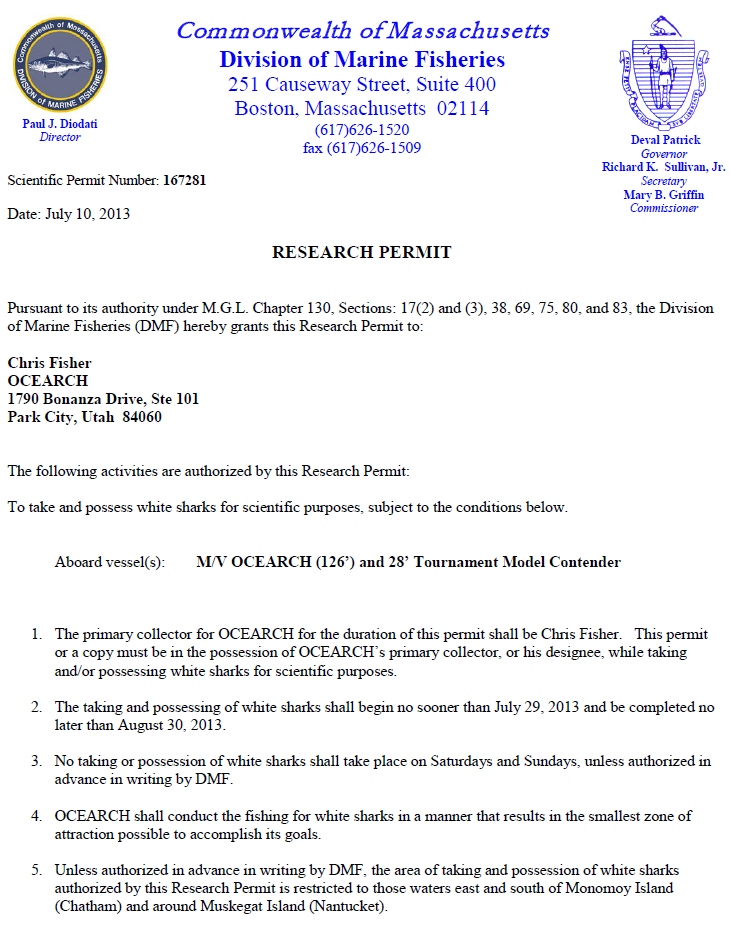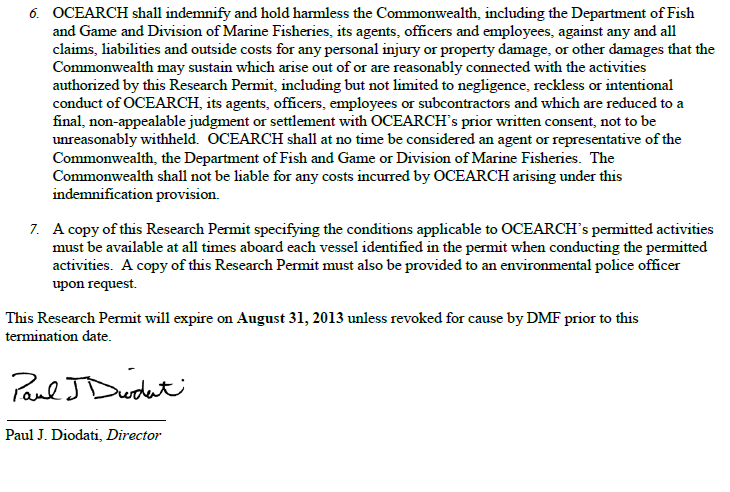OCEARCH Great White Shark Tracking Expedition off Cape Cod
Shark Year Magazine,01. August 2013
Below is copy of the Research Permit issued to Chris Fisher ( OCEARCH ) by the Masschusetts Division of Marine Fisheries. It was made public by ‘ White Shark Video ‘, a nonprofit corporation in California. The permit allows OCEARCH to ‘ take and possess white sharks for scientific purposes ‘ in the waters east and south of Monomoy Island (Chatham) and around Muskegat Island (Nantucket). The Research Permit will expire on 31st August 2013.
During the Marine Fisheries Commission Business Meeting on 20. June 2013, Paul Diodati ( the Director of the Massachusetts Division of Marine Fisheries DMF ) made the following comments about the 2013 white shark research priorities…. Quote (Source: DMF Draft Minutes ) :
Paul continued with his comments and moved on to discuss 2013 white shark research priorities. DMF will continue its acoustic tagging research. In addition, Paul recently met with Chris Fischer of OCEARCH to discuss continuing a research partnership with this group. For 2013, research is scheduled to begin in Massachusetts in late July and continue through August.
Ray Kane asked if this relationship with OCEARCH meant that DMF was moving away from acoustic tagging and prioritizing satellite tagging.Paul said that it did. He explained that satellite tags are preferable to acoustic tags because they collect more data, transmit data closer to real time,stay affixed to the sharks for longer periods and are more cost effective. Moreover, because OCEARCH captures the shark to affix the satellite tag it provides an opportunity for a number of additional tests to be conducted (e.g., genetics, health). Additionally, this year accelerometers will also be attached to the shark to monitor their pitch and yaw, which may give insight into where mating occurs. Ray Kane added that the accelerometers will also clarify their behavior during and after feeding.
Paul stated that despite these research benefits, there is some opposition to OCEARCH. A number of people object to OCEARCH’s methods including how they attract and capture sharks. With regards to attracting sharks, there was an incident in South Africa where a surfer was attacked and killed by a white shark while OCEARCH was chumming for sharks about 100 miles away.
Public perception was that OCEARCH was responsible for this death because of their work to attract sharks and their activities in South Africa were curtailed. Paul believed that the blame given to OCEARCH was overstated. Moreover, he was not concerned that a similar event would happen in Massachusetts, as OCEARCH would be less reliant on having to attract sharks because the sharks are already aggregated near shore to feed on seals. In addition, there are a group of individuals that believe OCEARCH’s capture methods are cruel and may physically harm the shark.
In addition to research priorities, DMF was pursuing regulations that would give the agency greater control over white shark chumming and research activity. This would limit the amount of activity, particularly non-expert activity, along eastern and southern Cape Cod that may poentially affect shark behavior and increase the probability of a shark attack. The Cape Cod White Shark Working Group, which includes eleven Cape Cod municipalities, the Town of Nantucket and the Cape Cod National Sea Shore supported the enactment of these regulations. However, he was unsure if he would be able to promulgate them in 2013.
Research Permit


